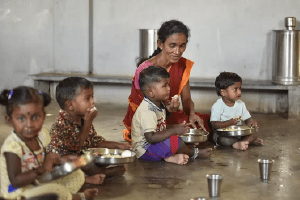Integrated Child Development Services (ICDS), a flagship program of the Government of India, offers nutrition services to support child development. One major component of ICDS is the Supplementary Nutrition Program (SNP), which provides take-home rations for all children under 6 years of age and pregnant and lactating women to bridge the calorie and protein gaps in their diets. Current SNP guidelines recommend providing the rations in the form of micronutrient-fortified food or energy-dense food to bridge the nutrient gap between the Recommend Dietary Allowance and Average Daily Intake (MoWCD 2014).
In Tamil Nadu, the take-home rations are a fortified-blended product called Sathumaavu. Coverage of take-home rations in Tamil Nadu is above the national average for all beneficiary groups, but variability across districts is high (IIPS and ICF 2021). Little is known about household use of Sathumaavu, perceptions of its quality, or its integration into standard diets. This study, a collaboration between LEAD at Krea University and the International Food Policy Research Institute (IFPRI) with the Government of Tamil Nadu, explored the uptake and use of Sathumaavu among women and children across the state.
The study aimed to:
- Assess the uptake and use of the ICDS-provided Sathumaavu in Tamil Nadu
- Examine demand- and supply-side factors related to the coverage and use of Sathumaavu





